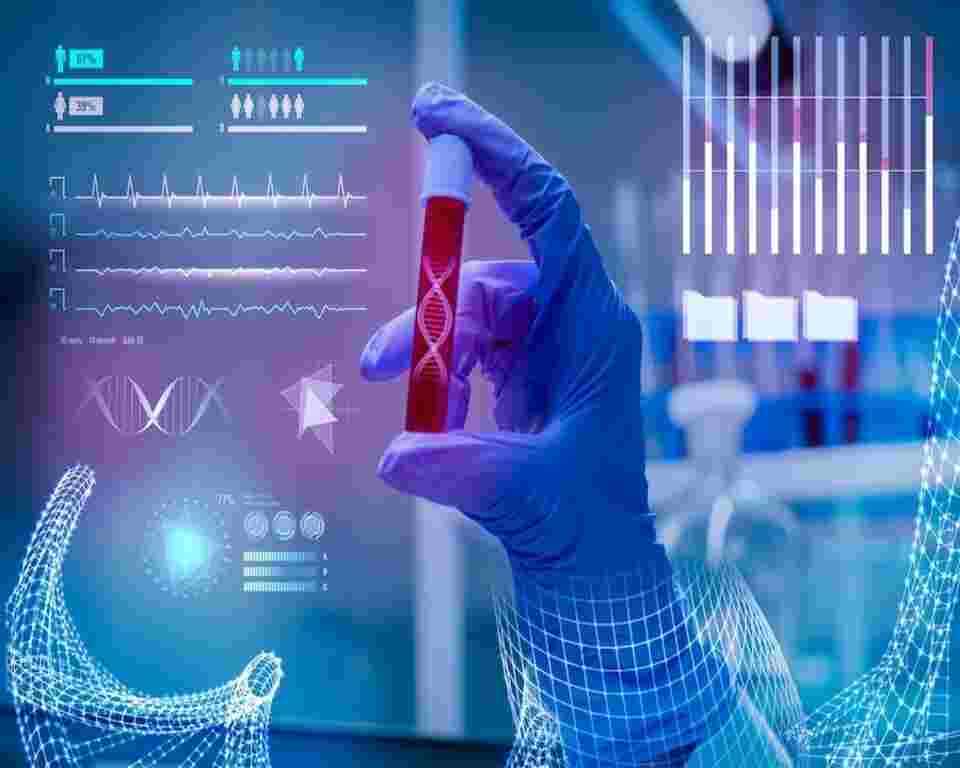
Welcome to a future where healthcare is revolutionized by the power of digital biomarkers.
Imagine a world where technology seamlessly integrates with medicine, offering personalized health monitoring like never before.
In this blog post, we will explore the top 5 benefits of digital biomarkers in boosting health and adapting medicine to meet individual needs.
Join us on this journey through innovation and discovery in the realm of healthcare!
What are Digital Biomarkers?
Digital biomarkers are a cutting-edge concept in healthcare that harnesses technology to monitor and track various physiological and behavioral data points.
These markers provide valuable insights into an individual’s health status, allowing for early detection of potential issues and personalized interventions.
Unlike traditional biomarkers measured through blood tests or imaging, digital biomarkers are collected passively through wearable devices, smartphone apps, or other digital tools.
This real-time data offers a more comprehensive and dynamic understanding of an individual’s health trends over time.
By analyzing patterns in data such as heart rate variability, sleep quality, activity levels, and more, healthcare professionals can gain deeper insights into a patient’s overall well-being.
Digital biomarkers hold immense potential in revolutionizing preventive care strategies by enabling proactive interventions based on continuous monitoring of key health metrics.
Incorporating digital biomarkers into routine healthcare practices can enhance disease management efficacy, improve treatment outcomes, and empower individuals to take charge of their health proactively.
As the field continues to evolve rapidly with advancements in technology and data analytics capabilities, the possibilities for leveraging digital biomarkers in personalized medicine are endless.
The Role of Technology in Healthcare
In today’s rapidly evolving healthcare landscape, technology plays a pivotal role in transforming the way we monitor and manage our health.
From wearable devices that track our physical activity to innovative apps that help us stay on top of medication schedules, technology has become an indispensable tool in healthcare.
The integration of digital solutions not only empowers individuals to take charge of their well-being but also enables healthcare providers to deliver more personalized and efficient care.
Telemedicine platforms allow patients to connect with doctors remotely, saving time and improving access to medical expertise.
Furthermore, advancements in artificial intelligence and data analytics have revolutionized disease prediction and diagnosis.
By harnessing the power of big data, healthcare professionals can identify patterns and trends that may go unnoticed through traditional methods alone.
As technology continues to advance at a rapid pace, the possibilities for enhancing patient outcomes and driving innovation in healthcare are limitless.
Embracing these technological advancements is key to shaping a healthier future for all.
Benefits of Digital Biomarkers in Health Monitoring
Digital biomarkers have revolutionized health monitoring by providing real-time, objective data on a person’s health status.
These innovative tools allow for continuous tracking of vital signs, activity levels, and other key health metrics without the need for frequent clinic visits.
By leveraging wearable devices and sensors, digital biomarkers offer valuable insights into an individual’s overall well-being.
One of the significant benefits of digital biomarkers is the early detection of potential health issues.
Through constant monitoring and analysis of data patterns, healthcare providers can identify subtle changes that may indicate underlying conditions or disease progression.
This proactive approach enables prompt intervention and personalized treatment plans tailored to each patient’s needs.
Moreover, digital biomarkers empower individuals to take charge of their health through self-monitoring and actionable feedback.
By receiving real-time alerts and personalized recommendations based on their unique data points, people can make informed decisions about lifestyle modifications or medical interventions to improve their outcomes.
The integration of digital biomarkers in health monitoring holds immense promise for enhancing preventive care strategies and optimizing treatment outcomes for better overall wellness.
Advancements in Personalized Medicine
Personalized medicine has revolutionized the healthcare industry by tailoring treatments to individual patients based on their unique characteristics.
Advances in technology have enabled healthcare providers to gather vast amounts of data, allowing for more precise and effective diagnosis and treatment plans.
By utilizing digital biomarkers, healthcare professionals can track real-time health data remotely, providing a deeper understanding of a patient’s condition.
This personalized approach not only improves patient outcomes but also reduces the risk of adverse reactions to medications.
With the ability to analyze genetic makeup, lifestyle factors, and environmental influences, personalized medicine offers a holistic view of an individual’s health.
By identifying specific biomarkers associated with certain conditions or diseases, doctors can intervene earlier and provide targeted interventions.
Advancements in personalized medicine are paving the way for more efficient and effective healthcare solutions that focus on prevention rather than just treatment.
The future holds even greater promise as technology continues to evolve and empower both patients and providers alike.

Case Studies and Success Stories
Case studies and success stories in the realm of digital biomarkers offer real-world examples of the transformative power of this technology.
One such case study involves a patient with a chronic condition who uses a wearable device to monitor their health parameters remotely.
Through continuous tracking, subtle changes were detected early, leading to timely interventions and improved outcomes.
In another success story, a clinical trial utilized digital biomarkers to gather precise data on participants’ responses to treatment.
This resulted in tailored healthcare strategies that maximized effectiveness and minimized side effects.
These instances underscore the potential for digital biomarkers to revolutionize personalized medicine by providing clinicians with detailed insights into individual health trends and responses.
As more case studies emerge showcasing the benefits of digital biomarkers, it becomes evident that this technology is not just a trend but a game-changer in healthcare delivery.
Challenges and Ethical Considerations
As we delve into the realm of digital biomarkers, it’s crucial to address the challenges and ethical considerations that come hand-in-hand with this innovative technology.
One major challenge is ensuring data privacy and security. With sensitive health information being collected through various devices, maintaining confidentiality becomes paramount.
Another issue revolves around data accuracy and reliability. As these biomarkers play a significant role in healthcare decisions, it’s essential to validate their effectiveness and consistency.
Ethical dilemmas arise concerning consent and autonomy.
Patients must have a clear understanding of how their data will be used and shared to make informed choices about participating in monitoring programs.
Furthermore, there are concerns about accessibility disparities among different populations.
Ensuring equitable access to digital biomarker technologies is critical for promoting inclusivity in healthcare advancements.
Navigating these challenges while upholding ethical standards is key to harnessing the full potential of digital biomarkers in revolutionizing personalized medicine.
The Future of Digital Biomarkers in Healthcare
As we look ahead to the future of healthcare, digital biomarkers are poised to revolutionize how we monitor health, diagnose conditions, and personalize treatment plans.
With advancements in technology and data analytics, the potential for digital biomarkers to enhance patient outcomes and streamline healthcare delivery is vast.
In the coming years, we can expect to see even more sophisticated algorithms that leverage artificial intelligence and machine learning to interpret complex biometric data accurately.
This will enable healthcare providers to not only detect diseases earlier but also tailor interventions based on individual patient needs.
Moreover, as wearable devices become more integrated into daily life, the collection of real-time health data will further empower individuals to take charge of their well-being proactively.
This shift towards preventive care could lead to a significant reduction in healthcare costs while improving overall population health.
While there are still challenges to address regarding data privacy, regulatory approval processes, and ethical considerations surrounding the use of digital biomarkers, the overarching benefits they bring cannot be overlooked.
The future of digital biomarkers in healthcare is bright – offering hope for more precise diagnostics, personalized treatments, and ultimately better health outcomes for all.
Conclusion
The advent of digital biomarkers heralds a new era in healthcare, characterized by unprecedented precision, personalization, and preemptive potential.
As we’ve explored, the integration of technology with traditional healthcare practices offers immense benefits, from enhancing disease detection and management to tailoring medicine to the individual’s unique health profile.
Despite the challenges and ethical considerations that must be navigated carefully, the future of digital biomarkers in healthcare is undeniably promising.
By embracing these advancements, we stand on the cusp of a healthcare revolution that prioritizes proactive care, optimizes treatment outcomes, and democratizes access to personalized medicine.
As technology and healthcare continue to evolve in tandem, the potential for digital biomarkers to transform patient care and wellness is limitless.
FAQs
Q1: What exactly are digital biomarkers?
Digital biomarkers are quantifiable physiological and behavioral data collected through digital devices like wearables or smartphone apps, offering real-time insights into an individual’s health status.
Q2: How do digital biomarkers benefit patients?
It enables early detection of health issues, personalized healthcare plans, improved disease management, and empowers patients with data to take proactive steps toward their health and wellness.
Q3: Can digital biomarkers replace traditional diagnostic methods?
While they may not replace traditional methods entirely, digital biomarkers complement them by providing additional, real-time data that can enhance disease detection, monitoring, and management.
Q4: What are the main challenges in the adoption of digital biomarkers?
Key challenges include ensuring data privacy and security, validating the accuracy and reliability of data, overcoming ethical dilemmas, and ensuring equitable access to technology.
Q5: What does the future hold for digital biomarkers?
The future points towards more advanced data analysis techniques, broader integration of AI and machine learning for predictive analytics, and a shift towards preventive healthcare, significantly impacting patient care and outcomes.






Comments are closed.